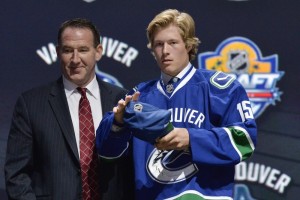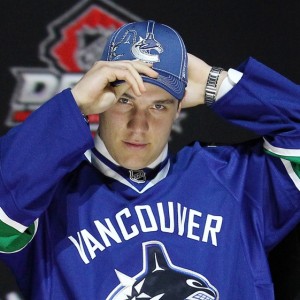Saturday night was slated to be an important one for the future of the Vancouver Canucks franchise.
The fan base endured months of tough-watching hockey this season, and anticipation for the draft lottery was more prevalent with each game down the stretch. In 2015-16, the Canucks lost 51 total games; that’s their most total losses in a full season in franchise history. Combine that with the fact that Vancouver has never selected first overall in the NHL draft, and surely they were overdue for the top pick. Surely they were due for even a top-three pick for the first time in 17 years. The odds were in their favor to do it, too.
The hockey gods, however, evidently didn’t think so; who else would be responsible for a random lottery ball to not bounce the Canucks way?
But let’s not forget, there’s nothing to pity about picking fifth overall. The Canucks management reiterated before and after the draft lottery that they “might win, but couldn’t lose.”
Trevor Linden: “Whether we draft 3 or 6, we’re getting a good player and a foundational player.” #Canucks
— Canucks Now (@CanucksNow) April 30, 2016
But the reality is, the top three projected picks in this year’s draft could have an immediate impact at the pro level. The Canucks won’t win their way into picking either Auston Matthews, Jesse Puljujarvi or Patrik Laine, but they could very well still earn one of these NHL-ready prospects.
Could the Canucks entice either the Jets or the Blue Jackets for the second or third overall pick? It may be a long shot, but it’s worth testing the waters.
Jets or Blue Jackets Pick is a Hard Bargain
Amassing only 75 points and finishing third to last in the league wasn’t enough to land a top-three draft pick, but the Canucks have enough assets to potentially move up. The Jets and the Blue Jackets, however, have rock solid reasons to stay right where they are.
Finishing 25th in the league standings, Winnipeg may have been the luckiest team on draft lottery day, and Jets fans should already be fantasizing at the potential in drafting Laine. He probably won’t score 76 goals as a rookie, like fellow Finn Teemu Selanne did as a Jet in 1992-93, but he’s sure to draw modern-day comparisons if he hasn’t already. The Jets have plenty of top-six forwards who can create offense, and now have the potential of adding a worldly shooter to the fold who can bury pucks at will.
Columbus, meanwhile, at third overall, will gladly settle with whichever Finn falls in their lap – whether it’s Laine or the remarkably complete player Puljujarvi. Finnish general manager Jarmo Kekäläinen surely wants to add one of these NHL-ready countrymen. And the team’s Finnish head scout, Ville Siren, likely knows as well as anybody just what kind of talent Columbus has a chance to acquire on draft day.
What Would it Take to Acquire No. 2 or 3 Pick?

In looking to swing a deal, Vancouver’s fifth overall pick would all but undoubtedly be involved, and a top-end prospect would surely be the main bid. Inquiring on Laine or Puljujarvi is a big ask, and Winnipeg or Columbus would almost certainly be asking for Jake Virtanen or Brock Boeser in return (the Canucks most promising young forwards after Bo Horvat). Those teams may even want more, based on the potential of drafting second or third this year, and could ask for the likes of Jared McCann, Cole Cassels or other budding prospects to be in the mix.
Canucks fans have watched Virtanen and Boeser develop greatly this season. Even with a chance to earn a top-three pick out of it, trading either of these youngsters isn’t the most appealing thought. In the salary-cap NHL, the best formula for winning is holding players near and dear who have been drafted and developed in the organization. For that reason, it’s almost redundant for the Canucks to look into trading a player they’ve helped get on their way, just to do it all over again with Laine or Puljujarvi.
However, on the flip side, the Canucks could look at it in the sense that they’re inches away from drafting one of two forwards with potential to be franchise players. While Matthews is the surefire No. 1 draft pick, it’s not every year that both of the second and third projected picks are so close behind.

Of course, with forwards like Pierre-Luc Dubois, Matthew Tkachuk and Alexander Nylander on the board, as well as blueliners Jacob Chychrun and Olli Juolevi, the fifth overall spot is bound to bring a bright young player. The ninth overall pick felt like a treat to the Canucks fan base in 2013 when they drafted Horvat, and their spot at sixth overall in 2014 where they picked Virtanen was hugely anticipated. So by simple math, drafting at No. 5 this year is still pretty ideal.
But Vancouver earned the right to draft in the top-three, and with the caliber of players in that prestigious group, they’ll almost certainly be looking at trade options to reclaim their rightful spot.
Sure, there’s nothing to lose for the Canucks should they pick at fifth overall in next month’s draft. The question is what there is to gain, and if it’s worth bargaining players who already look to be a part of the future.